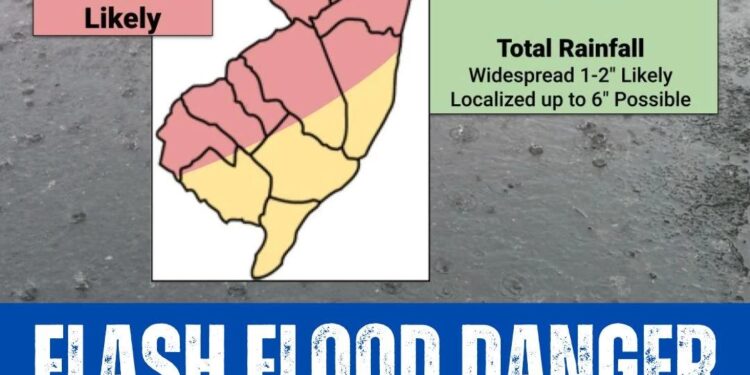New Jersey Faces Severe Flood Risks as Statewide Watch Issued Amid Predicted 7-Inch Rainfall
As New Jersey braces for extreme weather, the entire state has been placed under a flood watch, with meteorologists forecasting up to 7 inches of rain in some areas over the coming days. The National Weather Service has issued warnings, urging residents to prepare for potentially hazardous conditions that could lead to significant flooding, especially in low-lying regions. With heavy rain expected to begin later this week, authorities are advising local communities to remain vigilant and take necessary precautions to safeguard their homes and personal safety. This article explores the implications of the approaching storm, the measures being taken by emergency services, and how residents can stay informed and prepared.
New Jersey Braces for Historic Rainfall as Flood Watch Issued Statewide
As New Jersey prepares for an unprecedented weather event, meteorologists are warning residents to brace for historic rainfall that could lead to widespread flooding across the state. With predictions of up to 7 inches of rain, officials are emphasizing the importance of preparedness. Residents are encouraged to stay updated on local weather alerts and take necessary precautions, including securing outdoor belongings and securing plans for potential evacuations. Areas already prone to flooding are expected to bear the brunt of the deluge, prompting emergency services to be on high alert.
The New Jersey Office of Emergency Management has outlined crucial safety measures for residents, urging them to avoid flooded areas and use alternate routes if conditions worsen. Key recommendations include:
- Monitor local news and weather updates regularly.
- Have an emergency kit ready, including food, water, and medical supplies.
- Create a family communication plan in case of sudden evacuations.
| Area | Expected Rainfall (inches) | Flood Risk Level |
|---|---|---|
| Bergen County | 5-7 | High |
| Essex County | 4-6 | Moderate |
| Middlesex County | 3-5 | Moderate |
| Union County | 5-7 | High |
Residents are reminded that flood risks can change rapidly, so it is crucial to stay vigilant. Local authorities are coordinating responses and urge community members to report any unusual flooding conditions. By taking proactive measures and remaining informed, New Jerseyans can navigate this challenging weather event with greater safety and resilience.
Emergency Preparedness Tips for Residents Amid Flooding Threat
As the threat of significant flooding looms over New Jersey, residents are urged to take proactive measures to safeguard their homes and families. First and foremost, stay informed by monitoring local weather reports and warnings from the National Weather Service. Ensure that you have a reliable communication plan in place with family members and neighbors. Additionally, consider creating an emergency kit that includes essentials such as food, water, medications, and flashlights. Preparing your home is equally vital; clear gutters and downspouts, secure outdoor furniture, and move valuables to higher ground to mitigate potential damage.
In the event of an emergency, understanding the local resources available can be invaluable. Familiarize yourself with the locations of nearby evacuation centers and have a clear evacuation route mapped out. It’s also advisable to keep important documents, such as identification and insurance papers, in a waterproof container for easy access. Below is a helpful table summarizing essential items to include in your emergency kit:
| Essential Item | Quantity |
|---|---|
| Water (1 gallon per person/day) | 3+ days |
| Non-perishable food | 3+ days |
| Medications and prescriptions | As needed |
| Flashlight with extra batteries | 1 each |
| First aid kit | 1 |
Impact on Infrastructure and Community Services During Severe Weather Events
Severe weather events, such as the anticipated flooding in New Jersey, pose significant risks to the state’s infrastructure and community services. Local governments are faced with the challenge of maintaining essential operations while addressing the immediate dangers presented by rising waters. Roads can become impassable, compromising emergency services and delaying natural disaster response times. Additionally, power outages are common during such weather, disrupting communication systems and vital public services.
The impact on everyday life can be profound, with residents experiencing interruptions to critical community services. Some of the potential consequences include:
- Evacuations: High-risk areas may require evacuations, overwhelming shelter resources.
- Transportation: Flooded roads and bridges hinder access to hospitals and emergency clinics, complicating health services delivery.
- Utilities: Wastewater management systems may be compromised, leading to public health threats.
- Emergency Response: First responders face challenges in reaching those in need, as emergency vehicles navigate flooded conditions.
To illustrate the relationship between severe weather intensity and infrastructure readiness, consider the following table:
| Weather Event | Infrastructure Impact | Community Services Affected |
|---|---|---|
| Heavy Rainfall | Road Closures | Emergency Services |
| Flash Flooding | Bridge Failures | Hospital Access |
| Storm Surges | Utility Lines Down | Water and Sanitation |
| High Winds and Rain | Tree Damage on Roads | Evacuation Centers |
Final Thoughts
As New Jersey prepares for potentially severe weather, residents are urged to take the necessary precautions to ensure their safety. With forecasts predicting up to 7 inches of rain, local authorities and emergency services are on high alert, ready to respond to any flooding incidents that may arise. Stay informed by monitoring updates from the National Weather Service and local news outlets. As the situation develops, it is crucial for all New Jerseyans to prioritize their safety and remain vigilant. We will continue to follow this story and provide updates as the weather unfolds.
















